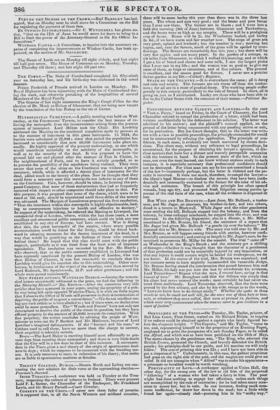CONFIDENCE BETWEEN CLIENTS AND LAWYERS.-.-IR the case "Vent v. Pacey,"
heard on Friday, in the Court of Chancery, the Lord Chancellor refused to compel the production of a letter, which had been written confidentially by the defendant to his solicitor. The letter was admitted in his answer; and the plaintiff's counsel applied, on the ground of the letter being unconnected with any pendina.b action or suit, for its production. But the Court thought, that as the letter was writ. ten with a view to possible proceedings, the principle contended for would not be contravened by refusing the application. The principle of con- fidence, in such cases, is evidently too much narrowed by recent deci- sions. The client may, without any reference to legal proceedings, be constrained, for the purpose of obtaining his lawyer s opinion, to dis- close matters that have but a distant and scarcely perceptible connexion with the business in hand. In the present state of the law, which no man, not even the most learned, can know without anxious study in each instance it is especially necessary that professional confidence should not be destroyed. For what man can say he has not committed a breach, of the law ?—innocently perhaps, but the letter is violated and the pe- nalty is incurred. It were too much, therefore, to compel the lawyer-. the client's legal Mentor—to disclose the secrets that have been confi- dentially and necessarily entrusted to the former for the sake of his ad. vice and assistance. The breach of this principle has often opened wounds, long ago dry, and promoted fresh litigation among parties ig. norant of the real facts of the case, when all the evidence is dispersed or lost.
BIG lirros AND BIG BONNETS.—La.st June, MT. Bullcock, a trades. man, and Mr. Jager' an attorney, his brother-in-law, and two others, dined in a tavern in Blackwell. While Jager and the other gentlemen were settling the bill, Bullcock stepped into the balcony, and from the balcony, by some unhappy mischance, he stepped into the river, and was drowned. In the following September, also at a dinner, a Mr. Millar mentioned to a Mr. Bruton, his friend, the existence of a report that Mr. Jagar had given Mr. Sullcock "a gentle tip over the balcony." He repeated this to Mr. Bruton's wife. The story was told over by Mr. and Mrs. Bruton, as will happen among friends with stories, however confi- dentially communicated ; and coming at length to Mr. Jagar's ears, he de- termined to prosecute Mr. Millar for the scandal. The trial "came off" on Wednesday in the King's Bench ; and the attorney got a shilling of damages—whether it was thought that the character of a gentleman of that profession could not be materially injured by any imputation, or that any injury it could sustain might be healed for twelvepence, we do not know. In the course of the trial, Mrs. Bruton was examined, and her costume seems to have mightily incommoded the venerable Judge. Mr. Bruton having stated the conversation that passed between him and Mr. Millar, his lady was put into the box to corroborate his evidence. Lord Tenterden—" Repeat what she says, I cannot hear, owing to thad bonnet of hers." Mr. Brougham said that the defence was simply that his client had never uttered the words : most certainly he had never ut- tered them maliciously. Lord Tenterden observed, that the facts were proved by the first witness, and also by his wife, except as to the words, "Lawyers know how to do things nicely." Whether she spoke to those words or not, he could not well tell, for she wore one of those hats or bon. nets, or whatever they were called, that were at present in fashion, and which were very inconvenient when the wearer came to give evidence in a court of justice."


























 Previous page
Previous page